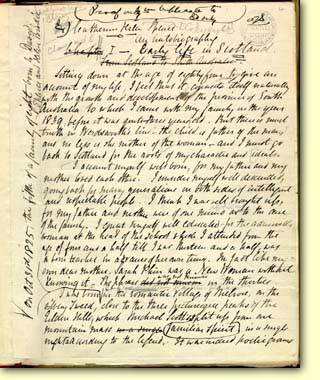
Political Awareness | In Parliament | The Workplace | Why South Australia?
The Aboriginal Voice | Cultural Diversity

"the garden of Paradise must have been in King William street"
 "Sitting down at the age of eighty-four to give an account
of my life, I feel that it connects itself naturally with the
growth and development of the province of South Australia, to
which I came with my family in the year 1839, before it was quite
three years old. . ."
"Sitting down at the age of eighty-four to give an account
of my life, I feel that it connects itself naturally with the
growth and development of the province of South Australia, to
which I came with my family in the year 1839, before it was quite
three years old. . ."
So begins the social reformer and writer Catherine Helen Spence in her autobiography. Shown here is the original manuscript of the autobiography, held in the State Library of South Australia archival record group PRG 88/6. The record group is available for people to look at on microfilm - the originals are kept for preservation. Several editions of the printed autobiography are also available.
"Looking back from the progressive heights of 1910 through the long vista of years, numbering upwards of four-fifths of a century, I rejoice at the progress the world has made. Side by side with the development of my State my life has slowly unfolded itself. My connection with many of the reforms to which is due this development has been intimate and (I think I am justified in saying) oftentimes helpful. While other States of the Commonwealth and the Dominion of New Zealand have made remarkable progress, none has eclipsed the rapid growth of the State to which the steps of my family were directed in 1839. Its growth has been more remarkable, because it has been primarily due to its initiation of many social and political reforms which have since been adopted by other and older countries.."
"But more important than all this was the fact that we took hold of the growth and development of South Australia, and identified ourselves with it. Nothing is insignificant in the history of a young community, and—above all—nothing seemed impossible. I had learned what wealth was, and a great deal about production and exchange for myself in the early history of South Australia—of the value of machinery, of roads and bridges, and of ports for transport and export. I had seen the 4lb. loaf at 4/- and at 4d. I had seen Adelaide the dearest and the cheapest place to live in. I had seen money orders for 2/6, and even for 6d, current when gold and silver were very scarce. Even before the discovery of copper South Australia had turned the corner. We had gone on the land and become primary producers, and before the gold discoveries in Victoria revolutionized Australia and attracted our male population across the border, the Central State was the only one which had a large surplus of wheat and hay to send to the goldfields.
Edward Wilson, of The Argus, riding overland to Adelaide about 1848, was amazed to see from Willunga onward fenced and cultivated farms, with decent homesteads and machinery up to date. The Ridley stripper enabled our people to reap and thresh the corn, when hands were all too few for the sickle. He said he felt as if the garden of Paradise must have been in King William street, and that the earliest difference in the world—that between Cain and Abel—was about the advantages of the 80-acre system. Australia generally had already to realize the fact that the pastoral industry was not enough for its development, and South Australia had seemed to solve the problem through the doctrinaire founders, of family immigration, small estates, and the development of agriculture, horticulture, and viticulture. We owed a great deal in the latter branches to our German settlers—sent out originally by Mr. G.F. Angas, whose interest was aroused by their suffering persecution for religious dissent—who saw that Australia had a better climate than that of the Fatherland. We owed much to Mr. George Stevenson, who was an enthusiastic gardener and fruitgrower, and lectured on these subjects, but the contrast between the environs of Adelaide and those of Sydney and Melbourne were striking, and Mr. Wilson never lost an opportunity of calling on the Victorian Legislature and the Victorian public to develop their own wonderful resources. When you take gold out of the ground there is less gold to win. When you grow golden grain or ruddy grapes this year you may expect as much and as good next year. My brother David went with the thousands to buy their fortunes at the diggings, but my brother John stuck to the Bank of South Australia."

| Copyright
©
2001 State Library of South Australia Disclaimer This page last updated on Thursday 24 October, 2013 14:48 Comments and enquiries to webmaster@slsa.sa.gov.au |
State Library of South Australia
North Terrace Adelaide 5000 Phone : +61 8 8207 7250 Fax : +61 8 8207 7307 Freecall : 1800 182 013 |